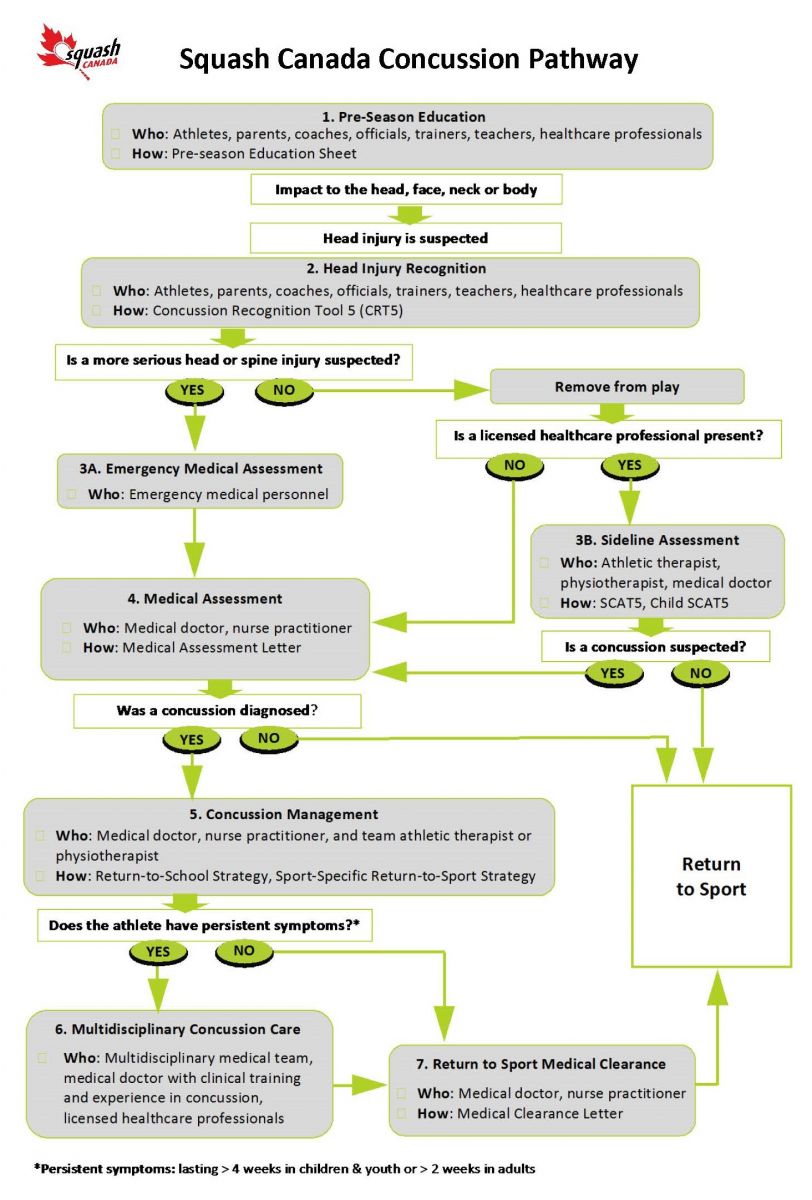Overview
Squash BC is committed to the safety of our participants. In a semi-contact sport like squash, it is important that participants, parents, coaches, officials, and others are aware of the risks of concussions, understand how to identify when a concussion may have occurred, and understand how to address a concussion before returning to sport.
What is a concussion?
A concussion is a brain injury that can’t be seen on x-rays, CT or MRI scans. It affects the way an athlete thinks and can cause a variety of symptoms.
WHAT CAUSES A CONCUSSION?
Any blow to the head, face or neck, or somewhere else on the body that causes a sudden jarring of the head may cause a concussion. Examples include getting body-checked in hockey or hitting one’s head on the floor in gym class.
WHEN SHOULD I SUSPECT A CONCUSSION?
A concussion should be suspected in any athlete who sustains a significant impact to the head, face, neck, or body and reports ANY symptoms or demonstrates ANY visual signs of a concussion. A concussion should also be suspected if an athlete reports ANY concussion symptoms to one of their peers, parents, teachers, or coaches or if anyone witnesses an athlete exhibiting ANY of the visual signs of concussion. Some athletes will develop symptoms immediately while others will develop delayed symptoms (beginning 24-48 hours after the injury).
WHAT ARE THE SYMPTOMS OF A CONCUSSION?
A person does not need to be knocked out (lose consciousness) to have had a concussion. Common symptoms include:
- Headaches or head pressure
- Dizziness
- Nausea and vomiting
- Blurred or fuzzy vision
- Sensitivity to light or sound
- Balance problems
- Feeling tired or having no energy
- Not thinking clearly
- Feeling slowed down
- Easily upset or angered
- Sadness
- Nervousness or anxiety
- Feeling more emotional
- Sleeping more or sleeping less
- Having a hard time falling asleep
- Difficulty working on a computer
- Difficulty reading
- Difficulty learning new information
WHAT ARE THE VISUAL SIGNS OF A CONCUSSION?
Visual signs of a concussion may include:
- Lying motionless on the playing surface
- Slow to get up after a direct or indirect hit to the head
- Disorientation or confusion or inability to respond appropriately to questions
- Blank or vacant stare
- Balance, gait difficulties, motor incoordination, stumbling, slow labored movements
- Facial injury after head trauma
- Clutching head
WHAT SHOULD I DO IF I SUSPECT A CONCUSSION?
If any athlete is suspected of sustaining a concussion during sports they should be immediately removed from play. Any athlete who is suspected of having sustained a concussion during sports must not be allowed to return to the same game or practice.
It is important that ALL athletes with a suspected concussion undergo medical assessment by a medical doctor or nurse practitioner, as soon as possible. It is also important that ALL athletes with a suspected concussion receive written medical clearance from a medical doctor or nurse practitioner before returning to sport activities.
Training Requirements
As part of Squash BC’s Safe Sport Requirements, several groups are required to complete concussion awareness training prior to commencing in their role at a Squash BC-sanctioned program, event, or activity. These groups include Coaches, Officials, and Tournament Safe Sport Representatives. Squash BC utilizes the NCCP Course Making Headway in Sport for this education.
MAKING HEADWAY IN SPORT (CONCUSSION AWARENESS)
Price: Free
NCCP Making Head Way in Sport is the NCCP’s free, online answer to the prevalence and ambiguity of concussions in sport. Parents, coaches, and athletes all benefit from knowing as much as possible about concussions; this online learning tool is designed to help coaches gain the knowledge and skills required to ensure the safety of their athletes.
More Information: https://coach.ca/nccp-making-head-way-sport
Registration Instructions:
- Navigate to thelocker.coach.ca and log in or create an account. If you are unsure if you already have a CAC/NCCP account, please email sportdevelopment@squashbc.com
- Once logged in, click the ELearning tab at the top of the screen
- On the left hand side of the screen you will see a list of available courses. Click “Making Head Way in Sport” and begin the training module.
Concussion Policies & Protocols
Squash BC utilizes several policies and protocols developed by Squash Canada to help address concussions. Learn more on Squash Canada’s Safe Sport Page.

Additional Resources
- Squash Canada Squash-Specific Return-to-Sport Strategy
- Squash Canada Concussion Education Sheet
- Squash BC – Incident Report
- Squash BC Athlete Accident Claim Form
- Concussion Management Program: Work with a clinic; someone registered to help assess and manage.
- Concussion Tracker App
- CAC – Concussion Awareness
- Parachute Canada

